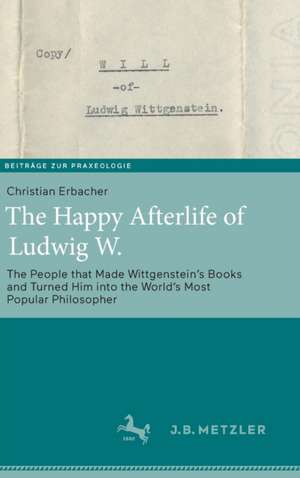The Happy Afterlife of Ludwig W.: The People that Made Wittgensteinʼs Books and Turned Him into the Worldʼs Most Popular Philosopher: Beiträge zur Praxeologie / Contributions to Praxeology
Autor Christian Erbacheren Limba Engleză Hardback – 31 mar 2023
Din seria Beiträge zur Praxeologie / Contributions to Praxeology
- 15%
 Preț: 556.75 lei
Preț: 556.75 lei -
 Preț: 350.24 lei
Preț: 350.24 lei -
 Preț: 391.02 lei
Preț: 391.02 lei -
 Preț: 360.70 lei
Preț: 360.70 lei -
 Preț: 301.73 lei
Preț: 301.73 lei -
 Preț: 295.91 lei
Preț: 295.91 lei
Preț: 324.81 lei
Nou
Puncte Express: 487
Preț estimativ în valută:
62.17€ • 67.56$ • 52.26£
62.17€ • 67.56$ • 52.26£
Carte tipărită la comandă
Livrare economică 21 aprilie-05 mai
Preluare comenzi: 021 569.72.76
Specificații
ISBN-13: 9783662661543
ISBN-10: 3662661543
Pagini: 207
Ilustrații: XIII, 207 p. 2 illus.
Dimensiuni: 155 x 235 mm
Greutate: 0.49 kg
Ediția:1st ed. 2023
Editura: Springer Berlin, Heidelberg
Colecția J.B. Metzler
Seria Beiträge zur Praxeologie / Contributions to Praxeology
Locul publicării:Berlin, Heidelberg, Germany
ISBN-10: 3662661543
Pagini: 207
Ilustrații: XIII, 207 p. 2 illus.
Dimensiuni: 155 x 235 mm
Greutate: 0.49 kg
Ediția:1st ed. 2023
Editura: Springer Berlin, Heidelberg
Colecția J.B. Metzler
Seria Beiträge zur Praxeologie / Contributions to Praxeology
Locul publicării:Berlin, Heidelberg, Germany
Cuprins
1. Editorial Approaches to Wittgenstein’s Nachlass.- 2. Wittgenstein and his Literary Executors.- 3. “Ludwig Wittgenstein”.- 4. “Good” Philosophical Reasons for “Bad” Editorial Philology?- 5. “Among the omitted stuff, there are many good remarks of a general nature”.- 6. The Tragedy of Tübingen.- 7. The Happy Afterlife of a Testament.
Notă biografică
Christian Erbacher received his doctorate from the University of Bergen (Norway) for his research at the Wittgenstein Archives at the University of Bergen (WAB). He has conducted several international research projects on the history of editing Wittgenstein. On this topic, he has published a number of journal articles as well as the monograph "Wittgenstein's Heirs and Editors" (Cambridge University Press, 2020). He works as a clinical psychologist in Germany.
Textul de pe ultima copertă
Some historiographies of philosophy give the impression that great philosophical works fall from the window of an ivory tower, in completed form, printed and bound, just in order to hit and inspire the next genius philosopher walking by. In actual fact, in the history of philosophy, there are a number of cases in which it takes the great philosophers’ pupils and followers to put their teachers’ thought into a publishable form. In the case of the posthumous publications of Wittgenstein’s writings, we can open, at least to some extent, the black box of the discipulary production processes involved in the making of a classic philosopher.
Caracteristici
New Insights into the “making of Wittgenstein” based on the use of new archival sources Praxeological approach to the historiography of philosophy Inspiring interdisciplinary research of philosophy, editorial studies, sociology and media sciences
